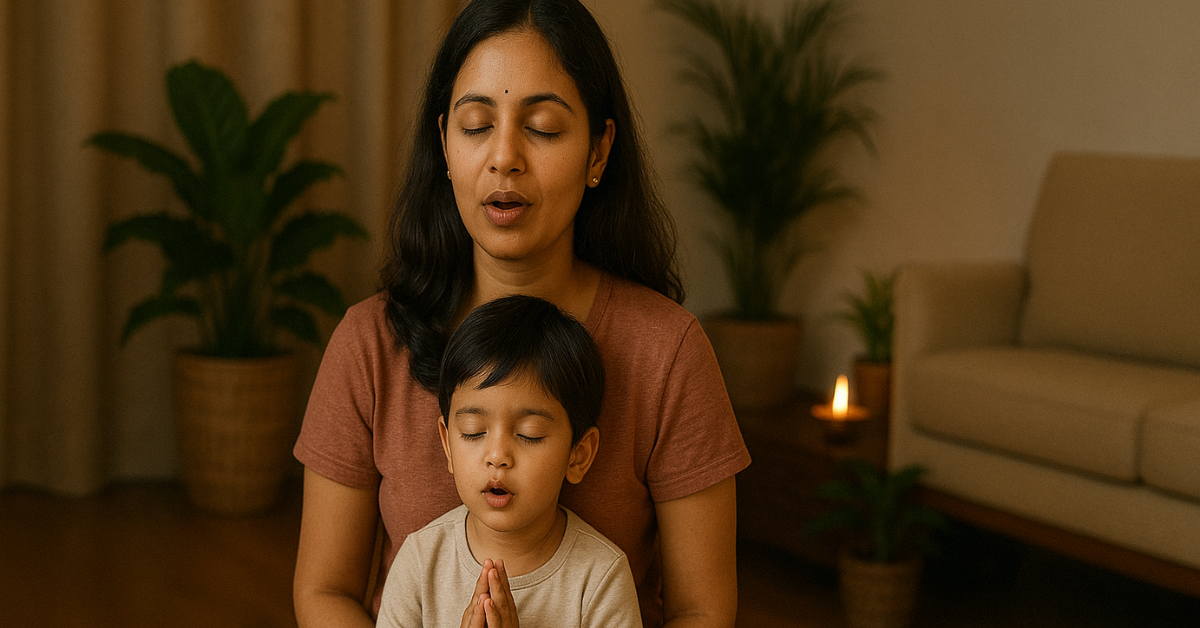Do you remember how childhood felt in the old days?
Mornings began with a prayer or the smell of agarbatti from the puja room. Afternoons were spent playing outside, and evenings brought family together for dinner and stories. Life felt slow, connected, and meaningful.
But today?
We wake up to phone notifications. Children start their day with screen time and spend hours indoors. Parents feel tired, rushed, and disconnected. Children are smart—but anxious. They’re full of energy—but often restless. They learn fast—but forget how to sit still or express emotions.
Many mothers share the same concern:
“My child doesn’t listen.”
“They get angry too fast.”
“They are always on the phone.”
If you’ve felt this too, you’re not alone.
This fast-paced life has taken away something very important—inner peace. That’s why now, more than ever, we need spiritual parenting.
It’s not about being religious.
It’s about raising children who are emotionally strong, kind, respectful, and connected—to themselves, to others, and to life.
What is Spiritual Parenting?
Spiritual parenting means bringing heart, soul, and values into your child’s daily life. It’s a way of parenting where we teach children to:
- Say thank you from the heart
- Help others without expecting anything in return
- Sit quietly with themselves for a few moments
- Talk to God in their own sweet way
- Listen to stories of kindness, truth, and faith
You don’t need to know everything about scriptures.
You don’t need to be a perfect parent.
Just small, meaningful actions—done with love—can make your parenting deeply spiritual.
Why is Spiritual Parenting Needed in the Digital Age?
Children today are growing up in a world filled with distractions:
- 5-year-olds can unlock phones and use YouTube
- 10-year-olds are already worried about looking good on social media
- Teenagers struggle with anxiety and sleep problems
Despite being surrounded by technology, many children feel alone inside.
Here’s what’s happening in many homes:
- Children get angry over small things
- They find it hard to concentrate
- Parents and children hardly talk about feelings
- Family time is being replaced by screen time
Spiritual parenting brings back the lost connection.
It helps children feel seen, safe, and supported. It helps parents slow down and be more present.
7 Powerful Benefits of Spiritual Parenting
1. Makes Children Emotionally Strong
When children practice gratitude or prayer, they slowly learn to handle emotions like anger, fear, and sadness.
For example, a simple habit like saying “Thank you, God” before meals teaches contentment.
A 7-year-old child once told his mom, “I didn’t cry in class today because I remembered our breathing game.”
That’s the power of inner strength.
2. Builds Confidence and Self-Love
Children who connect with their spiritual side learn to accept themselves. They feel loved not just for their marks or medals, but for who they are.
Spirituality tells them, “You are enough, just as you are.”
3. Teaches Good Values
Children learn by watching, not just listening.
When they see parents helping others, praying, or being honest, they naturally pick up values like truth, respect, and kindness.
A short Ramayana story or Panchatantra tale shared at bedtime can leave a lifelong impact.
4. Improves Focus and Patience
Lighting a diya every evening or chanting a mantra helps children calm their minds.
A 5-minute pause can do wonders in today’s rush.
One mother shared that after adding “Om chanting” before bedtime, her child started sleeping better and waking up happier.
5. Brings Family Closer
Praying or singing bhajans together creates shared memories. It’s not just about rituals—it’s about love, laughter, and stories.
When families sit together—even for just 10 minutes a day—the bond becomes stronger.
6. Encourages Gratitude
Spiritual children appreciate small things—a sunny day, a hug, a kind word.
They learn to say “thank you” not just with words, but with feelings.
This reduces jealousy, comparison, and greed.
7. Reduces Anxiety and Fear
When children feel connected to something greater—be it God, nature, or their inner self—they feel protected.
They know, “I’m not alone.”
Even a simple prayer like “Om Namah Shivaya” repeated during stress can become their safety anchor.
Simple Spiritual Habits to Try at Home
You don’t need to do everything. Pick 1–2 habits and do them daily with your child.
1. Morning Gratitude
After waking up, ask your child:
“What are three things you’re thankful for today?”
Let them say anything—“my toy,” “mumma’s hug,” “sunlight.”
This builds positivity and awareness.
2. Bedtime Story with a Message
Every night, tell your child a short story—from Krishna’s childhood, Ramayana, or simple folk tales.
After the story, ask, “What did we learn today?”
It makes them think, reflect, and grow.
3. Diya and Prayer Time
Light a diya together every evening. Say “Thank you, God,” and sit quietly for 2 minutes.
Children love small rituals—they feel peaceful and included.
4. Breathing for Calm
Teach your child to take three deep breaths when they feel angry or scared.
Say: “Let’s blow out the anger like a balloon.”
It becomes their tool for peace.
5. Weekly Bhajan Hour
Pick one evening every week. Play bhajans. Sing, dance, or simply sit together and enjoy the moment.
Let your home feel full of love and devotion.
Story Time: Krishna and the Butter Pot
Little Krishna loved butter. He would quietly steal it from the pots in his village, even when caught. But people loved him anyway—because his heart was full of joy and innocence.
What do we learn?
Let your child be playful and curious. Discipline them with love, not anger. Guide them gently—like Yashoda guided Krishna.
Children remember kindness more than rules.
Also Read: Gentle Parenting: What It Is and How to Start
Common Challenges Parents Face—and How to Handle Them
“My child doesn’t want to pray.”
Don’t force them. Let them observe you. Over time, they’ll join in out of curiosity.
“I don’t know stories or rituals.”
Start with one story a week. Use YouTube or CaringAai’s blog. Learn with your child—it’s okay.
“We don’t have time.”
Even 5 minutes a day can make a difference. Add spiritual moments into daily routines—during meals, walks, or bedtime.
“I’m not spiritual myself.”
That’s okay. You don’t need to be perfect. Just bring love, calm, and presence. That’s the heart of spirituality.
Use Technology in a Positive Way
Use screens with purpose:
- Play bhajans or mantras in the background during playtime
- Watch Bal Ganesh or Ramayana cartoons with your child
- Use gratitude journal apps or calming music for bedtime
The goal is to turn tech into a tool, not a trap.
Final Thoughts: You Are Raising a Soul, Not Just a Child
Every child is special—not just for what they achieve, but for who they are inside.
In this noisy world, spiritual parenting brings back silence, love, and meaning.
It helps your child become someone who is kind, calm, and deeply rooted in values.
And it helps you, as a parent, feel connected—not just to your child, but to your purpose.
So begin today. Light a diya. Say a small prayer. Hug your child a little longer.
Because parenting is not just about raising children—it’s about shaping souls.
FAQs
1. Is spiritual parenting only for religious families?
No. It’s for every parent who wants to raise kind, mindful, and emotionally strong children.
2. I don’t know any rituals or stories. Can I still start?
Yes. Start with simple habits like gratitude, storytelling, or breathing. You will learn as you go.
3. What age is best to start spiritual parenting?
Any age. Even toddlers can learn by watching. Start with small actions and build from there.
4. What if my child gets bored or resists?
Don’t force. Keep things joyful. Let them explore at their own pace. Spirituality is a journey, not a rule.
5. Is spiritual parenting different from regular parenting?Yes. It focuses not just on discipline or achievement—but on emotional peace, inner strength, and love.



Wow, what a great post. Very informative.